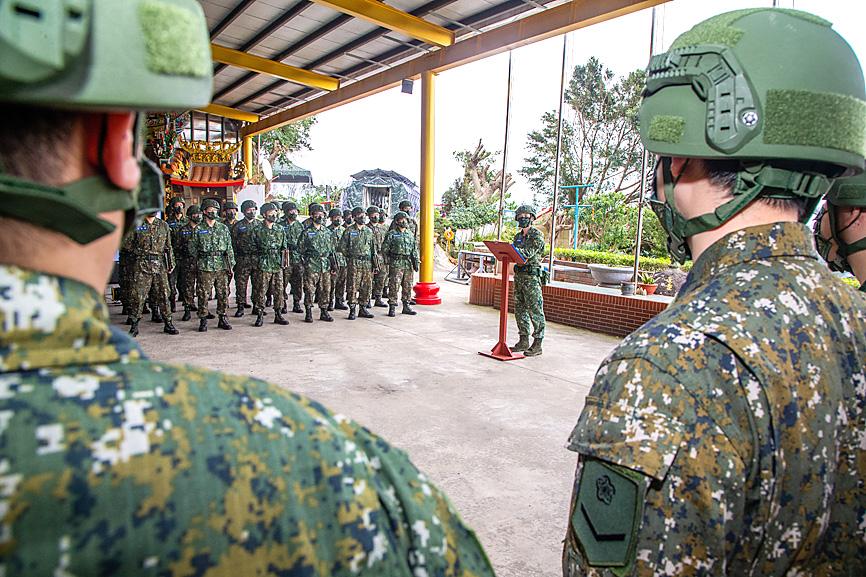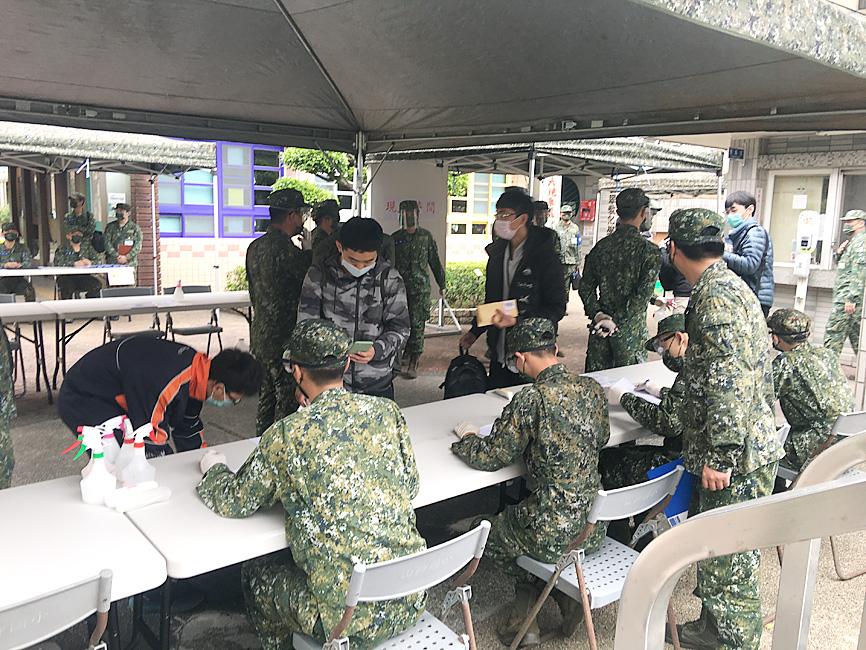The first batch of about 500 reservists yesterday reported to Shanjiao Elementary School in Taoyuan’s Lujhu District (蘆竹) to undergo a new, more intensive 14-day reservist training program.
The program is operating in a scenario of defending the beach near New Taipei City’s Linkou District (林口), said 203 Brigade Third Infantry Battalion Deputy Commander Major Chen Ming-chung (陳明中).
All reservists would train for about 10 hours a day, including a two-hour, 10km nighttime combat march, for a total of 136 hours over 14 days, Chen said.

Photo: Military News Agency
Reservists said that the schedule — described by local media as “the toughest reservist training in history” — was daunting, but that the invasion of Ukraine by Russia demonstrates that tougher reservist training is necessary.
No one knows when China might attack Taiwan, underscoring the necessity for a reservist force capable of fighting, one reservist said.
Reservists must be capable of fighting when called upon, as demonstrated by the suddenness of the Russian invasion of Ukraine, another said.

Photo: Hsieh Wu-hsiung, Taipei Times
A reservist surnamed Chou (周) said that the military should first step up the training for active soldiers.
It felt “odd” that the military would step up training for reservists, who have never undergone full military training to begin with, he said.
Commenting on concerns about reservists’ nutrition during the march, the Ministry of National Defense said that they would be provided with dried rations and ready-to-eat meal packages.
Reservists would only be allowed to use their mobile phones twice a day, from 7pm to 8pm and from 9pm to 10pm, during the two weeks.
All of the Central Epidemic Command Center’s COVID-19 pandemic prevention regulations would be observed, said Lee Meng-han (李孟涵), the battalion’s medical officer.
The reservists were yesterday given a quick recap of camp regulations, were assigned patrol and guard duties, and underwent disaster-prevention drills and first-aid training, their schedule showed.
Today and tomorrow, they would revisit military occupational specialty training, arms disassembly and assembly, and combat first-aid, the schedule showed.
All units under company level would be practicing marksmanship and combat from day four to day 10.
Days 11 to 13 would focus on battalion-level combat training, while reservists would on the last day service their arms and return them before the official conclusion of the program.
The new training regimen would be tested in the first three quarters of this year on about 15,000 reservists at 24 battalions and one company, Ministry of National Defense All-out Defense Mobilization Agency Director Yu Wen-cheng (俞文鎮) said on Wednedsay.
It was devised after the military in 2020 said that it wanted to ensure that the nation’s reserve force could more reliably back up regular forces due to increased Chinese military maneuvers around Taiwan.
Additional reporting by CNA

AGING: As of last month, people aged 65 or older accounted for 20.06 percent of the total population and the number of couples who got married fell by 18,685 from 2024 Taiwan has surpassed South Korea as the country least willing to have children, with an annual crude birthrate of 4.62 per 1,000 people, Ministry of the Interior data showed yesterday. The nation was previously ranked the second-lowest country in terms of total fertility rate, or the average number of children a woman has in her lifetime. However, South Korea’s fertility rate began to recover from 2023, with total fertility rate rising from 0.72 and estimated to reach 0.82 to 0.85 by last year, and the crude birthrate projected at 6.7 per 1,000 people. Japan’s crude birthrate was projected to fall below six,

Conflict with Taiwan could leave China with “massive economic disruption, catastrophic military losses, significant social unrest, and devastating sanctions,” a US think tank said in a report released on Monday. The German Marshall Fund released a report titled If China Attacks Taiwan: The Consequences for China of “Minor Conflict” and “Major War” Scenarios. The report details the “massive” economic, military, social and international costs to China in the event of a minor conflict or major war with Taiwan, estimating that the Chinese People’s Liberation Army (PLA) could sustain losses of more than half of its active-duty ground forces, including 100,000 troops. Understanding Chinese

US President Donald Trump in an interview with the New York Times published on Thursday said that “it’s up to” Chinese President Xi Jinping (習近平) what China does on Taiwan, but that he would be “very unhappy” with a change in the “status quo.” “He [Xi] considers it to be a part of China, and that’s up to him what he’s going to be doing, but I’ve expressed to him that I would be very unhappy if he did that, and I don’t think he’ll do that. I hope he doesn’t do that,” Trump said. Trump made the comments in the context

SELF-DEFENSE: Tokyo has accelerated its spending goal and its defense minister said the nation needs to discuss whether it should develop nuclear-powered submarines China is ramping up objections to what it sees as Japan’s desire to acquire nuclear weapons, despite Tokyo’s longstanding renunciation of such arms, deepening another fissure in the two neighbors’ increasingly tense ties. In what appears to be a concerted effort, China’s foreign and defense ministries issued statements on Thursday condemning alleged remilitarism efforts by Tokyo. The remarks came as two of the country’s top think tanks jointly issued a 29-page report framing actions by “right-wing forces” in Japan as posing a “serious threat” to world peace. While that report did not define “right-wing forces,” the Chinese Ministry of Foreign Affairs was